
views
Do your homework.

Learn what you can about the interviewee before you ever pick up the phone. If the person is a known author or speaker, take the time to read or listen to their work, or at least get familiar with their most recent or most important work. If the person is an official or leader, familiarize yourself with that person's organization. Look around the website. If the interview will cover recent events, review whatever is known publicly about those events.
Contact the interviewee.

Introduce yourself, identify the organization, business, or school you are associated with. Tell them what your article will be about, and why you would like to interview them. Politely ask if you can interview them. Schedule a time to meet in a quiet location, or schedule a time to interview the person by phone. Be respectful of the person's time and schedule.
Write down a list of questions beforehand.
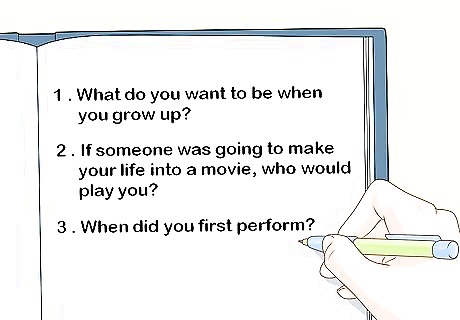
Work to make them relevant and concise. For flow, consider how the conversation might flow from one point to the next.
Bring a recording device to the interview.

You can use your phone or an audio recorder. This way you can focus all your attention on the interview and not scramble to write things down. This will make it easier to include direct quotes when you start writing.
Be courteous and hospitable.

Remember that being interviewed can be stressful, or at least unfamiliar. Arrive on time or a little early. Set up anything you need set up in advance. Sound check your recording device. Thank the person for agreeing to meet. If you are meeting in person, show the interviewee in, offer a seat, and offer water, coffee or tea. State any time limits out loud, right at the beginning of the visit. "Let's get started, so we can finish by 2pm and make sure you don't miss your next appointment." Ask the interviewee's permission to record their remarks.
Have a natural conversation.

Use your prepared questions as a guideline, reminder or cue; not simply a script or checklist. Don't just read your questions to the interviewee.
Begin with introductions.

Start by asking your subject to introduce him/herself, what they do that's relevant to the topic at hand, and how long they've done it. Pay close attention to what they are saying and make eye contact. Try to use what they are saying to think of more questions. Make it more a conversation than a list of questions.
Go into deeper discussion.
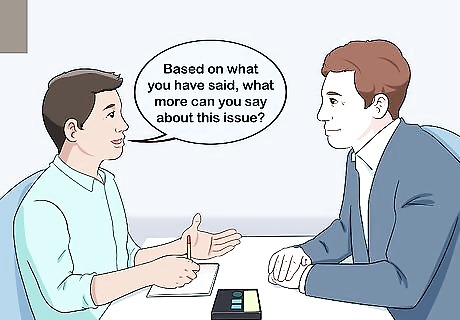
Ask the questions you need to know for your topic, but also try to ask questions based on what they say to you in previous responses. Experienced interviewers will ask their subjects about their personal thoughts and reactions to events and people they deal with. Personal references tend to elicit interesting and meaningful responses that will bring substance to an article.
Treat it like a conversation.

Unless you need to use the recording of the interview for a multimedia project, feel free to say words that show you are listening and understanding, like "yeah" and "mmhmm." If you actually need to use the audio of the interview in your final presentation, be as quiet as possible while the subject is speaking. Nodding your head or offering facial feedback can be an encouragement to the subject.
Steer the interview where it needs to go.
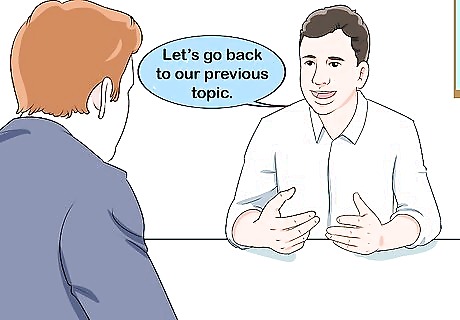
Guide the interview to elicit information you need by asking pointed questions. If the interviewee goes off on a tangent, steer them back to the area you're focusing on.
Don't ask too many questions.

Guide the interview but don't keep interrupting with question after question. The subject could feel overwhelmed and put on the spot.
Don't be nervous.

The interviewee is probably more uncomfortable than you are. Relax, smile and be confident. They may not even guess that you are new to interviewing.
Thank them when it's over.

Let them know the interview is done by saying "thank you so much. That is everything I need for my article."
End the interview when it seems appropriate.

Don't cut your subject off in mid-thought.
Confirm and write down the subject's full name.
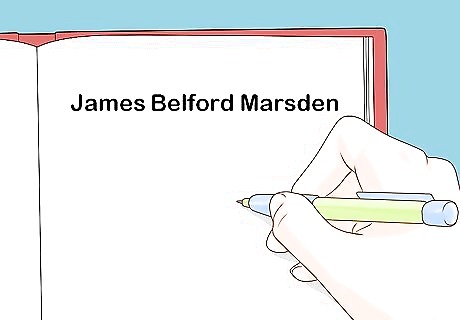
Especially ensure it is spelled correctly!
Offer a preview.
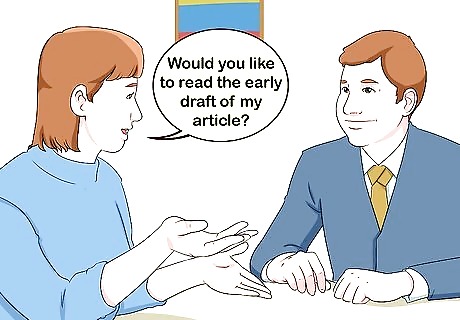
Offer to let the interviewee read an early draft of your writing, if appropriate. If the topic is at all controversial or sensitive, the interviewee may appreciate the chance to review your work before it's made public.
















Comments
0 comment